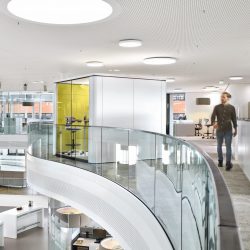To provide the best experiences, we use technologies like cookies to store and/or access device information. Consenting to these technologies will allow us to process data such as browsing behaviour or unique IDs on this site. Not consenting or withdrawing consent, may adversely affect certain features and functions.
The technical storage or access is strictly necessary for the legitimate purpose of enabling the use of a specific service explicitly requested by the subscriber or user, or for the sole purpose of carrying out the transmission of a communication over an electronic communications network.
The technical storage or access is necessary for the legitimate purpose of storing preferences that are not requested by the subscriber or user.
The technical storage or access that is used exclusively for statistical purposes.
The technical storage or access that is used exclusively for anonymous statistical purposes. Without a subpoena, voluntary compliance on the part of your Internet Service Provider, or additional records from a third party, information stored or retrieved for this purpose alone cannot usually be used to identify you.
The technical storage or access is required to create user profiles to send advertising, or to track the user on a website or across several websites for similar marketing purposes.
 Access to workplace counsellors, mental health training and support groups are topping the charts on what workers want on their return to the office, according to new research by CERT Property. (more…)
Access to workplace counsellors, mental health training and support groups are topping the charts on what workers want on their return to the office, according to new research by CERT Property. (more…)










 Research by
Research by 
 Additional time on people’s hands as a result of the pandemic has prompted the average British worker to pick up a range of good habits for their careers, according to a new study by
Additional time on people’s hands as a result of the pandemic has prompted the average British worker to pick up a range of good habits for their careers, according to a new study by 
 More than two-thirds (68 percent) of employees in the UK have admitted they get so many distractions and message notifications during work that it’s affecting their productivity. This is according to new research from
More than two-thirds (68 percent) of employees in the UK have admitted they get so many distractions and message notifications during work that it’s affecting their productivity. This is according to new research from 
 Heidrick and Struggles has released the results of a new global CEO study
Heidrick and Struggles has released the results of a new global CEO study 
 New research from beauty company
New research from beauty company 
 A fifth (19 percent) of employees do not know how their employer would support them if they were absent through ill-health or injury, 16 percent think that their employer provides no support and nine percent said they would only receive Statutory Sick Pay of £96.35 per week. This is according to new research from
A fifth (19 percent) of employees do not know how their employer would support them if they were absent through ill-health or injury, 16 percent think that their employer provides no support and nine percent said they would only receive Statutory Sick Pay of £96.35 per week. This is according to new research from 
 Egress’
Egress’ 
 The Mayor of London, in partnership with Nesta Challenges, has announced the winners of the
The Mayor of London, in partnership with Nesta Challenges, has announced the winners of the 
 Organisational purpose, responsible business practices and diversity are growing in importance at Board level and for HR teams, as employers make the connection between good environmental, societal and governance practices and business growth, according to survey findings from the Reward & Employee Benefits Association (
Organisational purpose, responsible business practices and diversity are growing in importance at Board level and for HR teams, as employers make the connection between good environmental, societal and governance practices and business growth, according to survey findings from the Reward & Employee Benefits Association (









